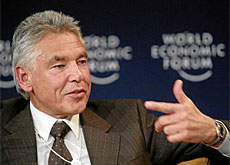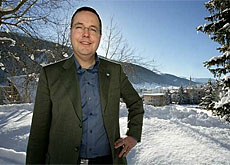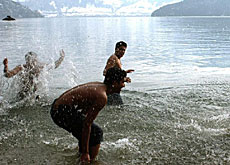Market forces could help climate says Brabeck

Nestlé boss Peter Brabeck-Letmathe admits that climate change is a fact of life, but says that markets forces could be used to attenuate some of its impact.
The head of the Swiss food multinational told swissinfo at the World Economic Forum (WEF) summit in Davos that issues related to water use are an example of how supply and demand could make consumers more aware of environmental issues.
Nestlé is among things the world’s biggest supplier of bottled water, with global sales of SFr8.8 billion ($7.02 billion) in 2005 and an estimated 18 per cent market share.
swissinfo: Do you believe that climate change is a real problem for the world and the economy?
Peter Brabeck-Letmathe: The climate is obviously undergoing change. It’s a problem that affects all of us and that we have to deal with. That said, the climate has always undergone change. It’s not happening for the first time now. It’s part of nature. So we have to learn how to deal with it. That’s what’s important.
swissinfo: Will climate change and the insecurity surrounding energy supplies have an impact on economic growth?
P.B.: Economic growth will continue for the next 20 to 30 years with the current energy outlook. The question now is how do we reduce or eliminate the negative effects of fossil fuels. The problem is not technical, but rather a pricing issue.
swissinfo: Concerning the environment and natural resources, what is the biggest challenge right now?
P.B.: in the short term, water is the biggest requirement for further development. Water is necessary for life, unlike petrol.
swissinfo: Do you think the world’s political and business leaders are sufficiently aware of these issues?
P.B.: There hasn’t been a single session here at the WEF that hasn’t referred to the impact of climate change. I think everyone is sufficiently aware. But there are two ways of approaching the problem. One implies paralysis, with a decision to stop climate change at all costs. I don’t think this is the right approach. The climate will change with or without us. What we need to work out is what it will cost to slow or accelerate some parameters of change. We have to look closely at how we can react in a constructive way to climate change.
swissinfo: What do you propose to do?
P.B.: I have already made a number of proposals. Look at water for example. It’s our most precious resource, yet most of it isn’t used for people’s most vital needs. Water is used irresponsibly in agriculture, which monopolises 70 to 75 per cent of the available resources. It wastes huge amounts – especially because of bad irrigation systems.
There are simple solutions, but there is no willingness to apply market forces to this precious resource.
swissinfo: Are market forces the only way of solving this type of problem?
P.B.: It’s not the only solution, but petrol has shown us how useful it can be to let the market come into play. When petrol prices climb quickly, consumers and the economy react immediately. Everybody seeks ways of countering the price increase.
[But you have to be careful.] You can use water, which usually doesn’t cost anything, to irrigate crops such as maize that is then turned into so-called green fuel. But by using a free resource, you are in fact massively subsidising biofuels.
You are also substituting petrol with a much more precious resource – water – because it costs nothing. It doesn’t seem to be a very intelligent idea to me!
swissinfo-interview: Pierre-François Besson in Davos
Global warming and security are the two dominant topics at this year’s WEF summit, according to the organisers.
In an informal vote, participants said climate change was both the major issue facing the world and the one that the world was least ready to deal with.
There are a total 17 sessions focusing on climate change, featuring topics to help companies and governments navigate the legalities of implementing policy changes aimed at curbing emissions and pollution and how to make going green profitable.
The 2007 WEF summit is taking from January 24 to 28.
There are some 2,400 participants, including heads of states, ministers, business leaders, and more than 400 researchers and representatives of civil society.
Peter Brabeck is representing Nestlé, the world’s biggest food multinational.
The group’s brands include Vittel, Contrex, Perrier, San Pellegrino, Maggi, Buitoni and Cailler.

In compliance with the JTI standards
More: SWI swissinfo.ch certified by the Journalism Trust Initiative











You can find an overview of ongoing debates with our journalists here . Please join us!
If you want to start a conversation about a topic raised in this article or want to report factual errors, email us at english@swissinfo.ch.